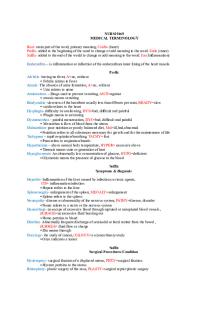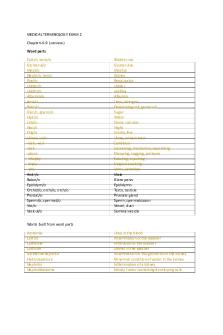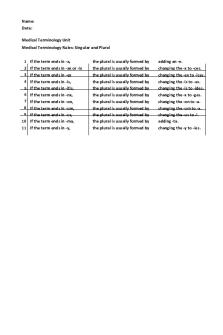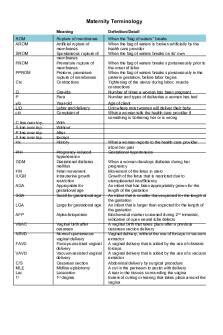Latein - -Alphabet & Pronounciation -Grammatics in Medical Terminology PDF

| Title | Latein - -Alphabet & Pronounciation -Grammatics in Medical Terminology |
|---|---|
| Course | Latin Language |
| Institution | Medical University-Varna |
| Pages | 11 |
| File Size | 601.6 KB |
| File Type | |
| Total Downloads | 40 |
| Total Views | 132 |
Summary
-Alphabet & Pronounciation
-Grammatics in Medical Terminology...
Description
Rules Alphabet & Pronounciation Alphabet ● ● ●
The same as in english, except Latin has no w: Aa, Bb, Cc, Dd, Ee, Ff, Gg, Hh, Ii, Jj, Kk, Ll, Mm, Nn, Oo, Pp, Qq, Rr, Ss, Tt, Uu, Vv, Xx, Yy, Zz Y and Z are burrowed from the greek alphabet about 50 B.C. to represent sound in greek loandwords. They were put at the end of the latin Alphabet. The division of the letters into vowels and consonants is the same as in English except i.
Pronounciation ● ●
Roman pronounciation of Latin aims to represent approxiamately the pronounciation of classical times. The simple vowels are: a, e, i, o, u, y
● The classical system had no way of distinguishing i and j, both where writtin I (inctura, ictus) N.B.: ● I as a consonant is always like y in yes: iuveniles, ieiunu, maior ● Y is always a vowel and pronounced like Latin i. It occurs only in words with a greek root: dystrophia, pyelitis, tympanum ● In Latin every vowel is pronounced. ● A latin word never begins with an Y.
Diphtongs ●
●
The letter groups ae and oe are both pronounced e: o ae: venae, anaemia o oe: foetor, foetus, oesophagus In the following diphtongs, both vowel sounds are heard, one following the other: o au: auris, aurum, claustrum o eu: neutrum, neutralis o ei: reum deinde o ui: fkuidus, cui, huic
Consonants ●
Consonants are generally pronounced as in English, with some exceptions: o C: ● Before e, i, y, ae, eu, oe it is pronounced ts: cerebrum, cellula, cito, cystis … ● Elsewhere it is pronounced hard like a k: caput, cartilago, collum, cor … o K and G are pronounced hard in all positions: ● G: cartilago, gutta, signum ● K was introduced from greek and is only used in foreign (greek or arab) words: Leukemia, Keratis, Kalium o H is merely a breathing word: homo, hepa, herma …
o o o o
● ●
S is always sharp: status, sudor, saliva … V: vena, vertebra, vesica … X has the value o two consonant (cs or gs): apex, plexus, pollex … Z (ds, z) is introduced from the geek and only occurs in foreigns greek words: zona, zygoma, trapezia; ts in: Zincum, influenza Qu and gu before a vowel have the sound of qv and gv: aqua, quinque, lingua, sanguis, unguis Ti: o Beore a vowel it is pronounced tsi: operatio o After s or x it is pronounced ti: combustio
Aspirates ●
ch, ph, th, rh are aspirates and represent sounds absent from early Latin. They are almost exclusively from greek words and lost their aspiration in latin: o ch: chronicus, nucha, cholera … o ph: pharynx, phlebitis, phtitis … o th: thorax, therapia, thymus … o rh: thinitis, rhaphe, heorrhagia …
Quantity of vowels ● ●
Vowels are either long or short. There are two types of long vowels: o Long-by-nature-vowel: see page 15
o
●
Long-by-position-wovel: a vowel followed by two consonants (columna, maxilla, reflexus) Short wovels: a vowel before another vowel or h is short
Syllables ● ●
A syllable consists of a vowel and a diphtong with or without one or more consonants. Basi rules to divide Latin words into syllables: A single consonant is joined to the following vowel: hi-lus Doubled consonants are always seperated: fos-sa, am-pul-la
● ● ● ●
Other combinations of two or more consonants are regularly seperated, and the first consonant is joined with the preceding vowel: trun-cus A latin word has as many syllables as vowels and diphtongs The last syllable of a word is called ultima; the one next to the last penult; the one before the penult antepenult. The quantity of a vowel or a syllable is the time it takes to pronounce it. Correct pronounciation and accent depend upon the proper observance of quantity. Syllables are either long or short: A syllable is short, if it ends on a vowel: aal-ve-o-lus A syllable is long, ● if it contains a long vowel or a diphtong: rup-tu-ra, gan-grae-na ● if it ends in a consonant which is followed by another consonant: cor-pus, mag-nus, me-do-ca-men-tum
Accent ● ● ●
Except in monosyllables, the ultima syllable is never stressed: et, sed Words of two syllables are accented on the first: vena, caput, cervix … Words of more than two syllables are accented on the penult if that is long either by nature or by position: fractura, intestinum, profundus …); otherwise on the antepenult: circulus, remedium, organum)
Grammatics in Medical Terminology Parts of speech ●
● ● ● ●
● ● ●
Generally speaking, the works which comprise the medical terminology are nouns and adjectives (including particles). Of course there are also some vervs and adverbs, a number of preposition and numerals. A noun is the name of a person, place, idea, thing, object or confition: costa, cephalgia … An adjective goes together with a noun and attributes a quality: longus, facialis … A participle is a word that attributes quality like an adjective but is derived from a verb: circumscriptus, ambulans … A numeral is a word, figure, or group of figures denoting a number. Greek and Latin numeral prefixes, Latin ordinal, Roman numerals, as well as Arabic numerals are used: diplegia, bicephalus, trigeminus … A Verb is a word used to show that an action is taking place. Verbs appear seldom in medical terminology: signa (imperative), signetur (subjunctive) An Adverb is a word used to express the time, place or manner of an assertion or attribute: cito (with great speed) A Preposition is a word which shows the relation between a nound and some other word or words in the same phrae: in vitro (in artificial environment)
Grammatical catgories of nouns ● ● ●
● ● ●
●
Genus - Gender of nouns The genders distinguished in Latin are three: Masculine, Feminine, Neuter The gender of Latin nouns is either natural or grammatical: o Natural gender is a distiction to the sex of the denoted object: homo (m), vir (m), femina (f), uxor (f), planta (f), radix (f) o Grammatical gender: nouns denoting things or qualities are often chosen by the ending of their nomanative singular: fundus (m), tela (f), natio (f), collum (n), os (n) The gender of a noun is always constant and never changes. Numerus - Number Nouns (Adjectives and Particles) are declined in two numbers: Singularis (sg.): glandula, lens Pluralis (pl.): glandulae, dentes Casus - Case
The cases of nouns express their relations to other words in the sentence, respectively in a medical collocation (term or diagnose). Nouns, Adjectives, and Participles are declined in six cases: Nominativus (Nom.) - Nominative: ● The Nominative is confined to its use as Subject, or Predicate Noun: Puer scribit, Puella pulchra est. ● When possible the Predicate Noun usually agrees with its Subject in gender: Philosophia magistra vitae est. ● As the Latin verb is not used in the medical terminology it is important to remeber that: All of the entries of nouns and adjectives in a dictionary are usually listed in the form of their Nominative singular. Phraseological collocations (phrases) in medical Latin representing a combination of a noun with an attribute adjective (participle) are also in the Nominative: musculus longus, os breve, vertebrae thoracicae (pl.), Mentha piperita Genitivus (Gen.) - Genitive: ● In Nouns the Genitive defines themeaning of the limited noun more closely. When two substantives having a relation to one another, the one which determines the relation is put in the Genitive. It is gramatically known as Genitive of Posession. ● The Genitive basically inclues a noun in Nominative plus a noun in Genitive: caput costae (head of rip), fractura costae (fracture of rib), puritus ani (irritation of the anus), herva Valerianae (herb of valerian) ● In phraseological collocations, the first term (noun) is always in the Nominative, and the second one in Genitive: lamina arcus vertebrae (plate of vertebral arch), lamina interna ossium cranii (internal plate of te bones of the cranium) Dativus (Dat.) - Dative ● The Dative is the case of the Indirect Object. The most commonly use of the Dative is to denote the person to whom something is given, said, ord done.● It is not used in medical terminology Accusativus (Acc.) - Accusative ● The Accusative is the case of the Direct Object of a transitive verb and answers the question Whom? or What?: Medicus puellam curat (Doctor cures the girl); Librum lego (I read the book) ● In medical terminology the Accusative is used with prepositions in the so called Prepositional Phrases: ●
● Examples: ad saturatum (ad. Sat.; to saturation); per os (p.o.; by or through the mouth) Ablativus (Abl.) - Ablative ● May usually be translated by the Objective with from, by, with, in or at. It is often used with prepositions: Pater cum puella venit (Father comes with the girl); In urbe habitat (He dwells in the citty). ● In mediacl therminology the Ablative is used with prepositions in the so called Prepositional Phrases
●
Examples: a tergo (in the rear); in vitro (in an artificial environment)
N.B.: ● The Nominative and the Genitive singular and plural are in general used to provide specialinsight into Latin medical terminology. The Nomative is the default case for terms. ● The Accusative and the Ablative singular and plural are used with a number of prepositions in the medical terminology. A noun governed by a preposition must be in Accusative or Ablative.
Syntactic Structure of Medical Terms ● ● ●
● ●
Substantive-Adjective Connection. Agreement of Adjectives As in many European languages, nouns and their modifying adjectives must agree in Gender, Number, and Case. The adjective usually comes after the noun. Adjectives are used to qualiy or modify nouns.
Relation of the Noun to another When two substantives of a different signification meet together, the latter is put in the genitive case.
Declension of Nouns
●
●
●
●
When nouns undergo inflection through the various cases, they are said to decline. Declension is produced by adding terminations (case-endings) originally significant to different forms of stems. Nouns are classified into five main groups or declensions, each with a distinctive set of case-endings. Nouns are inflected in five Delensions, sitinguished by their final letter (characteristic). Some of the Declensions have further subgroups (subdivisions) The largest declensions are the first, second and third. The fourth and fifth declensions are absent from Greek terms.
Notice that one declension often includes multiple nominative singular endings, but only one genitive singular ending.
Stem and Base ●
● ● ●
Stem: The body of a word, to which the terminations are attached. A stem is that basic part of a Latin word which remains unchanged despite changes in the word as a whole made to express differences of case and number. All endings that can be attached to the same stem are called case-endings or inflexions. Base: Part of the word which is unchanged n inflection: nerv- in nervus. The base and the stem are often identical and used synonymously.
Compound words ● ● ● ● ● ●
● ●
Word roots are the foundations of words and are not used by themselves Combining form: A root with a combining vowel Combining vowel: usually an o. The combining vowel has no meaning of ist own, but enables two word elements to become connected Compound word: more than one word root or combining form can be joined Prefixes are used to modify or qualify the meaning of word roots Suffixes are word endings that form nouns or adjectives. Some suffices combine with word roots to form adjectives, words that modify nouns by indicating quality or quantity or by distinguishing one thing from another Compound clinical terms are formed by combining two or more roots. Greek roots are usually combined with the vowel -o- in compound words: gasr-o-scopia, cyst-o-plegia.
The combining vowel -i- is used in words of Latin origin: viv-i-ficatio Stems of compound words may be also combined without the combining vowel, if the first component (root) ends in a vowel or the second one begins with one: brady-cardia, hemi-plegia, neur-algia, hyster-ectomia ● Important rule: Greek roots are used to build words that describe a disease, condition, treatment, or diagnosis Latin roots are used to build words that describe anatomical structures ● ●
Combining forms Roots with a combining wovel are called combining forms: A combining vowel may be added between a root and a suffix A combining vowel usually is not used if the suffix begins with a vowel: oste- / osteo- + -algia = ostealgia ● When a suffix beginning with rh is added to a root, the r is doubled: hem/o- + -rhagia = hemorrhagia; men/o- + -rhea = menorrhea
●
Declensions First Declension ●
First declension nouns in latin are mostly feminine: Nominative singular: -a Genitive singular: -ae Stem: -a
●
Exceptions: The ending on the first declension nouns is characterized by an "a". However there are also common first declension nouns that are masculine. This is a small category of masculine exceptions which generally refer to occupations. Greek nouns. The substantives either retain their Greek forms exclusively, or have Greek and Latin forms side by side. These variations occur principally in the Singular and in the Plural the declension is usually regular.
Second Declension of Masculine Nouns ● ● ● ●
Masculine 'us' ending Nominative singular: -us Genitive singular: -i Stem: -o
● ● ● ●
Masculine 'er' ending Nominative singular: - er Genitive singular: -i Stem: -o
● ●
Masculine 'ir' ending The only second declension noun ending 'ir' is: vir, viri m
Latin sayings Nota bene (N. B.): Note well; pay attention Disce pati: Learn to endure Doctus cum multis libris: learned with many books; a polymath Tu ne cede alis sed contra audentior ito: yield not to misfortunes, but advance more boldly against them. Quod cito acquiritur cito perit: That which is quickly gained is quickly lost. Duos qui sequitur lepores neutrum capit: The one who follows two hares is sure to catch neither. Denique non omnes eadem mirantur amantque: All men do not admire and love the same thing. Otium sine litteris mors est: Leisure without literature is death Aut disce, aut discede: Either learn or leave. Qui non proficit, deficit: The one who does nt make progress, loses ground.
Si nescis loqui, auscultare disce: If you do not know how to talk, learn to listen. Patientia victrix: Patience is victorius. Quod scripsi scripsi: What I have written have i written. Labor omnia vincit improbus: Unceasing effort conquers all. Caeca invidia est: Eny is blind. Non onia possumus omnes: All of us cannot do everything. De nihilo nihil fit: From nothing, nothing can come. Est modus in rebus: There is a mean (or: method) in everything. Tempus fugit: Time flies. Omnia praclara rara: All excellent things are rare. Imperare sibi maximum imperium est: To rule yourself is the ultimate power. Veritas numqua perit: Truth never perishes. Ad marginem: At margin (Notes written in a book). Festina lente: Hurry slowly (i. e. proceed quickly but with caution) Vincit qui paitur: He who perseveres, conquers. Sapiens qui prospicit: The one who is wise looks ahead. Omnia dicta fortiora si dicta Latina: Everything sound more impressive when said in Latin. Et ipsa scientia potestas est: Knowledge itself is power. Per scientiam ad saltumen aegroti: To heal the sick through knowledge. Plenus venter non sutdet libenter: A full belly doesn't like studying. Volo non valeo: I'm willing but unable. Tempora mutantur, et nos mutamur in illis: Times change, and we change with them. Vultus est index animi: The face is a sign of the soul. Primum non nocere: First, do no harm. (Has become an ethical guiding principle in medical profession: avoiding actions that may worsen a patient's disease or suffering) Qui rogat, non errat.: Who asks, does not err.
Scio me nihil scire: I know that I know nothing. Ignoscas aliis multa, nil tibi. Alma mater: Nourishing mother Varietas delectat: Variety is delighting. Omnia mea mecum porto: I carry everything that is mine with me. Ignorantia juris non excusat: Ignorance of the law does not excuse. Verbum (Dictum) sapienti sat (est): A word to the wise is sufficient. Medici graviores morbos asperis remediis curant: Doctors cure he more serious diseases with harsh remedies. Bonum vinum laetificat or hominis: Good wine gladdens a person's heart. Post factum: After the fact. Qui scribit, bis legit: Whro writes, reads twice. Qui non est hodie cras minus aptus erit: He who is ot prepared today will be less so tomorrow. Cogito, ergo sum: I think, therefore I am. Do ut des: I give, that you may give. Age quod agis: Do what you do; do well what you do; be serious in what you do. Fama volat: Rumour has wings. Inter amicos omnium rerum communitas: Among friends all things are common. Sine amicitia vitam esse nullam: There is no life without friendship. Radix omnium malorum cupiditas est: The love for money is the root to all kinds of evil. Tempus edax rerum: Time is the consumer of all things. Sol omnibus lucet: The sun shines upon us all. Divide et impera: Divide and conquer Ubi bene, ibi patria: Where you feel good, there is your home. Qui dormit, non peccat: One who sleeps doesn't sind. Surdo fabulam narras: You are telling your story to a deaf man. Bis dat, qui cito dat: He gives twice who quickly gives.
Scientia est potentia: Knowledge is power. Agire pro viribus: Act according to your strength. Si caput dolet omnia membra languent: If the ead aches, all the members languish. Non scholae sed vitae discimus: We learn not for school but for life Historia magistra vitae est: History is the tutor of life Nulla est medicina sine lingua Latina: Medicine is nothing without Latin. Sine docrina vita est quasi mortis imago: Without learning, life is but the image of death. Gutta cavat lapidem, non vi sed saepe cadendo: The drop excavates the stone, not with force but by falling often. Parva scintilla saepe magnam flammam excitat: The small sparkle often initiates a larger flame. Nemo in amore videt: No one in love sees. Medice, cura te ipsum: Physician, heal thyself! Medicus curat, natura sanat: The physician treats, nature cures. Similia similibus curantur: Like cures like (Like is cured by like. The same is cured by the same) Contraria contrariis curantur: The opposte is cured with the opposite. Aquila non captat muscas: The eagle doesn't capture flies. Qui tacet consentire videtur: The one who is silent is seen to consent. Vir bonus dicendi peritus: A good man skilled in the art of speaking....
Similar Free PDFs

Medical Terminology
- 50 Pages

Medical Terminology
- 6 Pages

Medical Terminology
- 2 Pages

Medical Terminology
- 4 Pages

Medical Terminology EXAM 2
- 4 Pages

Medical terminology Modules
- 158 Pages

Medical Terminology Terms
- 22 Pages

Medical Terminology-Plurals Quiz
- 3 Pages

Medical terminology 17
- 4 Pages

Med term - medical terminology
- 20 Pages

Medical Terminology Final Exam
- 5 Pages

Medical terminology 2
- 3 Pages

Medical terminology 22
- 2 Pages

Medical Terminology 2018
- 3 Pages
Popular Institutions
- Tinajero National High School - Annex
- Politeknik Caltex Riau
- Yokohama City University
- SGT University
- University of Al-Qadisiyah
- Divine Word College of Vigan
- Techniek College Rotterdam
- Universidade de Santiago
- Universiti Teknologi MARA Cawangan Johor Kampus Pasir Gudang
- Poltekkes Kemenkes Yogyakarta
- Baguio City National High School
- Colegio san marcos
- preparatoria uno
- Centro de Bachillerato Tecnológico Industrial y de Servicios No. 107
- Dalian Maritime University
- Quang Trung Secondary School
- Colegio Tecnológico en Informática
- Corporación Regional de Educación Superior
- Grupo CEDVA
- Dar Al Uloom University
- Centro de Estudios Preuniversitarios de la Universidad Nacional de Ingeniería
- 上智大学
- Aakash International School, Nuna Majara
- San Felipe Neri Catholic School
- Kang Chiao International School - New Taipei City
- Misamis Occidental National High School
- Institución Educativa Escuela Normal Juan Ladrilleros
- Kolehiyo ng Pantukan
- Batanes State College
- Instituto Continental
- Sekolah Menengah Kejuruan Kesehatan Kaltara (Tarakan)
- Colegio de La Inmaculada Concepcion - Cebu

